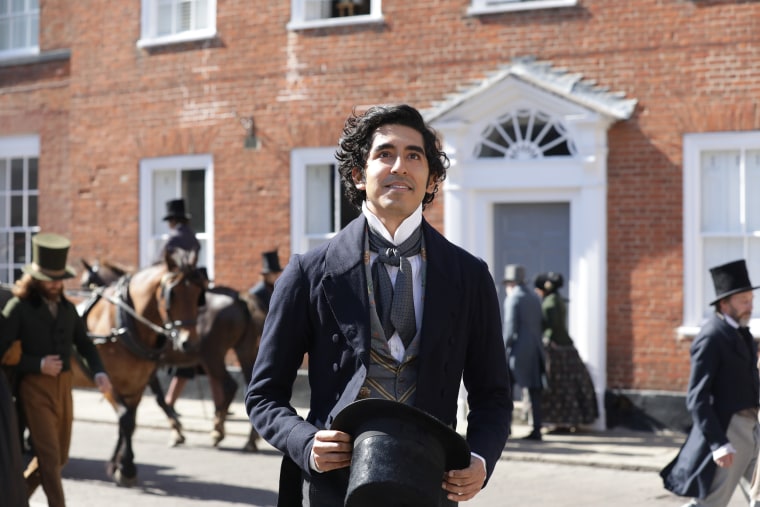Armando Iannucci's "The Personal History of David Copperfield" could hardly arrive at a more opportune moment: 27 million Americans are out of work, according to the Bureau of Labor Statistics. A million of them filed new unemployment claims last week, part of a rise that began in April. That also happens to be when many people stopped paying rent, and in September, most bans on eviction enacted by state and local governments at the beginning of the COVID-19 pandemic will expire. That means 30 million people will be at risk of eviction by the end of next month.
To the extent that they are not already, things are about to get Dickensian.
Charles Dickens' novel, on which the film is based, is about reversals in the fortunes of a boy and then a young man — who is much like Dickens himself. It is filled with his glorious witticisms and adroit, complex caricatures. But its backdrop — the squalor of Industrial Revolution-era London — is suddenly timely in a profoundly horrible way.
This is the eighth live-action feature film of "David Copperfield," but it is the first to prominently feature actors of color throughout the cast; of all of Iannucci's directorial intrusions into a well-known story, this is by far the most effective. (Dev Patel is especially good as the hero, and 11-year-old Jairaj Varsani is a delight as his younger self.) The white majority in Dickens' England was much larger than it is today — and far, far larger than in the contemporary U.S. — and since his characters have remained white (with the very occasional exception) for more than a century of movies and television miniseries, the sudden presence of actors of color throughout the story's Byzantine class structure surprises us with very different contemporary parallels.
What if we always reflexively thought about the modern-day plight of meat processing workers, who are mostly people of color, as a shameful throwback to the 19th century? What if, instead of worshipping his business acumen, we had always considered cruel warehouse magnate Jeff Bezos, the richest man in history, with the same derision Iannucci treats wine bottle tycoon Mr. Murdstone?
Iannucci populates a 19th-century tale about the excesses of capitalism — moral and otherwise — with a cast that looks more like the 21st century. It's a way of reminding us that racial and class divisions cut differently, and not always in the directions we expect.
Beyond the clever casting, Iannucci's adaptation belongs to a contemporary strain of literary movies (many of them British) that investigates what it means to base one work of art on another, rather than simply smoosh all the events of a long novel into a TV miniseries with some pretty actors.
Here, Iannucci has cut away much of the plot but left both Dickens' comedy (which works beautifully) and the protagonist's writerly genius (which doesn't work as well) at its center.
"Whether I shall turn out to be the hero of my own life, or whether that station will be held by anybody else, these pages must show," Copperfield begins in Dickens's novel; Iannucci seems to suggest that Copperfield is the hero, but I'm not sure he should be. Ultimately, in the novel, David is valuable because he is one of many funny, flawed, big-hearted characters, not because he is uniquely virtuous or brilliant. He is like the rest: sometimes wicked, sometimes good, sometimes gentry, sometimes homeless.
To see ourselves as one among many who are just like us, especially in the midst of suffering: That was Dickens' talent, and his gift to his readers was to bind them to Earth in the same way. In this "David Copperfield," we see his layers of meaning and emotional depth even in the story's villains. Ben Whishaw's marvelous Uriah Heep is a contemptible traitor, but when David makes fun of him to earn laughs from his new schoolmates, it's David, not Uriah, we dislike. Some of the story's characters are perfectly good, and some are perfectly bad, but many of them are neither, just perfectly drawn — particularly by great actors like Hugh Laurie and Peter Capaldi, as Mr. Dick and Mr. Micawber respectively.
This richness of character against the raw despair of familiar (and now, in our own lives, potentially forthcoming) mass poverty is a necessary reminder of our shared humanity at a time when circumstances seem to conspire against that particular generosity. Though there are many villains in Dickens' stories, none of them controls the world; each is simply bad in his own way, sometimes even pitiably so.
Increasingly, empathy feels like a luxury, even an indulgence. Can we really afford to understand people in all their contradictions when our understanding is often deliberately misconstrued as our approval and this political moment is so urgent?
Yes, we can — or rather, we can't afford not to.




